|
|
|
|
|
|
|
|
Due North: Next Generation Arctic Research & Leadership, November 5-8, 2015 (Calgary, Alberta, Canada). The Association of Canadian Universities for Northern Studies (ACUNS) will convene an interdisciplinary conference of early career scientists working on Arctic issues. Topics will include: Arctic Communities, Arctic Sustainable Development, Arctic Wildlife, Ecosystem and Biodiversity, Arctic Food Security, Arctic Landscapes, Climate Change and Adaptation, Disaster Risk Management, Policy, Politics and Leadership, Arctic Environment (Data and Techniques), Arctic Resources, and Future of Arctic.
The Polar Oceans and Global Climate Change, November 3-6, 2015 (La Jolla, California USA). The American Polar Society will host this Symposium at Scripps Institution of Oceanography. A flyer with a partial list of presenters is available on the Society's website ( americanpolar.org) and from the Society's Membership Chairman by email.
Forum for Arctic Modeling and Observational Synthesis Meeting, November 3-6, 2015 (Cape Cod, MA, USA). On November 3rd, the 2015 School for young scientists will consider "Regional Oceanography of the Arctic marginal seas" with lectures covering major features of atmospheric, sea ice and oceanographic regimes of the: Bering, Chukchi, Beaufort, East-Siberian, Laptev Sea, Kara, Barents and Nordic seas. On November 4-6, the meeting portion will summarize project accomplishments for the last 3 years of activities and will focus on the formulation of scientific questions and directions for FAMOS future research (2016-2019) to: (a) improve Arctic modeling, employing very high resolution models; (b) develop and test new arctic monitoring/observing systems and (c) improve predictions of Arctic environmental parameters with reduced uncertainties.
Today's Congressional Action:
The House and Senate are not in session.
|
 Pebble Finds Friends on US House Panel. Proponents of the Pebble mine in southwestern Alaska brought their case to the U.S. House today. Pebble says the EPA collaborated with mine opponents to restrict the project, in what the company calls a pre-emptive veto, because Pebble hasn't applied for federal permits yet. Pebble got a sympathetic ear from the Republicans on the House Science, Space and Technology Committee. This hearing wasn't really about the mine. It was about process. Specifically, whether the EPA used an objective process to restrict the mine, or whether the agency just went through the motions to reach a predetermined conclusion. Pebble CEO Tom Collier says he was outraged when he read through the stacks of emails between EPA staff and mine opponents. Alaska Public Radio Pebble Finds Friends on US House Panel. Proponents of the Pebble mine in southwestern Alaska brought their case to the U.S. House today. Pebble says the EPA collaborated with mine opponents to restrict the project, in what the company calls a pre-emptive veto, because Pebble hasn't applied for federal permits yet. Pebble got a sympathetic ear from the Republicans on the House Science, Space and Technology Committee. This hearing wasn't really about the mine. It was about process. Specifically, whether the EPA used an objective process to restrict the mine, or whether the agency just went through the motions to reach a predetermined conclusion. Pebble CEO Tom Collier says he was outraged when he read through the stacks of emails between EPA staff and mine opponents. Alaska Public Radio
Climate Change Made Arctic Alaska Hospitable to Snowshoe Hares, Study Says. Though abundant over much of mainland Alaska, snowshoe hares were, until recently, absent from the state's northernmost Arctic region. When did they arrive, and why? A new study says the long-eared, big-footed hares, denizens of the boreal forests of northern North America, likely became established in Arctic Alaska in the middle or late 1970s, following the growth of tall shrubs in more northern areas brought on by gradual warming. Alaska Dispatch News
 Aging Instruments Make Greenland Ice Sheet Look Darker, Warmer: New Research. Old satellite-borne instruments, not soot or dust, seem to be responsible for results that suggest "dirty ice" or "dark snow" are causing the Greenland ice sheet to melt. A new Dartmouth College-led study published in the online Geophysical Research Letters journal, shows that "degrading satellite sensors," not increased soot and dust caused by fallout from fossil fuel pollution and forest fires, are responsible for the apparent decline in the reflectivity of inland ice across northern Greenland. Nunatsiaq Online Aging Instruments Make Greenland Ice Sheet Look Darker, Warmer: New Research. Old satellite-borne instruments, not soot or dust, seem to be responsible for results that suggest "dirty ice" or "dark snow" are causing the Greenland ice sheet to melt. A new Dartmouth College-led study published in the online Geophysical Research Letters journal, shows that "degrading satellite sensors," not increased soot and dust caused by fallout from fossil fuel pollution and forest fires, are responsible for the apparent decline in the reflectivity of inland ice across northern Greenland. Nunatsiaq Online
[Opinion] The Arctic Paradox Poses Questions About Sustainable Development. Call it a contradiction of glacial proportions-an Arctic paradox. The world pushes for stronger protective measures to curb climate change scientists say is accelerating the destruction of the Arctic-melting ice sheets, thawing frozen soil and threatening the iconic polar bear. Call it plan A. There is a contingency plan, however, that takes advantage of new Arctic opportunities-in shipping, mining, drilling and national security-if the big melt continues apace. Call it plan B. Scientific American
Shrinking Ice Caps, Rising Seas and Key Features of Climate Change, Part II. The status of ice at the Earth's north and south poles provides one of the clearest indicators of climate change, according to Dr. Henry Pollack. And the poles, especially the Arctic, are in the process of a giant meltdown. The reason is global warming, which more than 95 percent of scientists consider to be caused by humans. The Voice
 The Greenland Ice Sheet Contains Nutrients from Precipitation. New research shows that the ice sheet on Greenland contains the nutrient phosphorus, which was carried by the atmosphere across the country, where it fell with precipitation. Studies of the ice core drilling through the kilometers-thick ice sheet shows that there are differences in the amount of phosphorus in warm and cold climate periods. This new knowledge is important for understanding how the nutrient, phosphorus can be expected to flow into the Arctic Ocean when the climate warms and the ice melts and flows into the sea, where nutrients give rise to increased algae growth. The results have been published in the Journal of Geophysical Research. The University of Copenhagen The Greenland Ice Sheet Contains Nutrients from Precipitation. New research shows that the ice sheet on Greenland contains the nutrient phosphorus, which was carried by the atmosphere across the country, where it fell with precipitation. Studies of the ice core drilling through the kilometers-thick ice sheet shows that there are differences in the amount of phosphorus in warm and cold climate periods. This new knowledge is important for understanding how the nutrient, phosphorus can be expected to flow into the Arctic Ocean when the climate warms and the ice melts and flows into the sea, where nutrients give rise to increased algae growth. The results have been published in the Journal of Geophysical Research. The University of Copenhagen
Murmansk Opens the Arctic 'Super University.' The first news about the establishment of the Arctic University appeared in the local media last autumn, when the government had created a special working group. Today, the topic is being actively discussed both on the regional, national and international level. The Arctic University will reportedly offer unique resources: more than six hundred professors and teachers, and more than twenty groups of higher education majors. A base for the Arctic University will be the present Murmansk State Humanities University. Barents Observer
On Wednesday, Canada's New Cabinet Was Sworn in But Amid All the Pomp and Ceremony, Two Ministers Weren't Properly Recognized: The New Ministers of Cute. Throatsinging is like a musical competition. The song ends when one of the two women or girls performing collapses into laughter. Or in the case of Metcalfe and Degrandpre, an infectious fit of giggles. BuzzFeed
|
Legislative Action
No Arctic legislation was formally considered yesterday.
|
|
Future Events
Matchpoints Seminar, November 12-13, 2015 (Aarhus, Denmark). The purpose of the conference is to provide a forum for policy-makers and academics to deliberate on how the security, resilience and sustainability of the globalized Arctic region and its peoples may be enhanced, and what instruments of governance may most suitably contribute. The conference will spell out (1) how the different relevant dimensions of security (military, economic, environmental, energy and human security) manifest themselves in the governing / governance arrangements in the Arctic; (2) how the challenges associated with each manifest themselves, individually and together; and (3) what forms of governing arrangements can best help to address the challenges. The conference will also focus on (4) how the Nordic countries and nations, including Greenland, the Faroe Islands and Aaland Islands, may contribute to the peace, stability and prosperity of the Arctic region through collaborative efforts based on their shared social, human, environmental and democratic values.
Arctic Circle Forum (ACF) Singapore, November 12, 2015 (Singapore). The event will be hosted by The Arctic Circle and Singapore Maritime Institute (SMI), with the support of the Singapore Government. The ACF Singapore will be opened by President of Iceland Ólafur Ragner Grímsson and Deputy Prime Minister and Coordinating Minister for National Security of Singapore Teo Chee Hean. Discussions will focus on a range of topics related to Arctic shipping, infrastructure financing, ocean science and research, as well as global collaboration on Arctic affairs. Among the speakers and participants will be Senior Arctic Officials, representatives of major shipping companies, investment funds, and scientific institutes from the United States, Europe, and a number of Asian states.
Arctic Observing Open Science Meeting, November 17-19, 2015 (Seattle, Washington). The Arctic Observing Open Science Meeting will be 2.5 days and held at the Hyatt at Olive 8 in Seattle, Washington. The conference will bring together individuals and teams involved in the collection, processing, analysis, and use of observations in the Arctic - from academia, agencies, industry, and other organizations. The meeting will be convened as a combination of plenary talks, parallel science sessions, and a poster session. The deadline for the Meeting Registration is Tuesday, 20 October. The agenda and registered attendees can be found on the meeting website.
In the Spirit of the Rovaniemi Process 2015, November 24-26, 2015 (Rovaniemi, Lapland, Finland).When the Arctic Environmental Protection Strategy, the so-called Rovaniemi Process, was adopted in 1991, it aimed at overcoming divisions and turning the zone of Cold War military tensions into a region of peace and co-operation. In this joint effort focusing on the protection of environment, and later, sustainable development, the Arctic states supported by indigenous organizations laid grounds for institutionalized collaboration and the emergence of Arctic regional identity. The second international conference will bring together decision-makers, scholars, artists, designers and students to address these questions and discuss the Arctic in global, regional and local perspectives.
Arctic Council and Beyond, December 4, 2015 (Ottawa, Ontario, Canada). This one-day conference hosted by The Northern Institute will focus on the role of the Arctic Council as a forum for Arctic cooperation, the place of the Arctic in Canada's foreign policy and approach to the circumpolar world, the role of the Arctic in global relations in light of the increasing interest in the region by European and Asian states, and the voice of Indigenous Peoples within the Arctic Council and in shaping circumpolar countries' Arctic policies.
Paris Arctic Climate Research Strategy Meeting, December 4, 2015 (Paris, France). The purpose of this facilitated discussion is to discuss future regional, national, and international funding opportunities for interdisciplinary Arctic climate research and develop concrete ideas for such research. All disciplines across humanities, social and natural sciences, art, health, technology and others as well as representatives of research, government, civil society, business and others are encouraged to attend.
Arctic Encounter Paris (AEP 2015), December 11-12, 2015 (Paris, France) (During the UN Convention on Climate Change - COP21). The Arctic Encounter Paris will take place at the French Senate at Luxembourg Palace and the  French Military College, École Militaire, in Paris, France, on the final days of the monumental United Nations Convention on Climate Change (COP21) where thousands of global citizens and government delegates will be gathered to deliberate the world's response to our changing planet in Paris. The AEP is the only Arctic policy side event currently planned to take place during the UN Convention. A reception will take place following the closing panel. French Military College, École Militaire, in Paris, France, on the final days of the monumental United Nations Convention on Climate Change (COP21) where thousands of global citizens and government delegates will be gathered to deliberate the world's response to our changing planet in Paris. The AEP is the only Arctic policy side event currently planned to take place during the UN Convention. A reception will take place following the closing panel.
 Fall meeting of the American Geophysical Union, December 14-18, 2015 (San Francisco, California). The 48th meeting of the union brings together nearly 24,000attendees, and lots of Arctic research results. The scientific program is here. There will be several Arctic-related "Town Hall" meetings, including those sponsored by NASA, DOE, NSF, ISAC, IARPC, and SEARCH. Fall meeting of the American Geophysical Union, December 14-18, 2015 (San Francisco, California). The 48th meeting of the union brings together nearly 24,000attendees, and lots of Arctic research results. The scientific program is here. There will be several Arctic-related "Town Hall" meetings, including those sponsored by NASA, DOE, NSF, ISAC, IARPC, and SEARCH.
This symposium is part of an ongoing initiative of the National Academies of Science Polar Research Board to expand public understanding of why the dramatic changes affecting the Arctic region ultimately matter to us all. The agenda features engaging presentations and discussions with top Arctic science and policy experts, and displays and interactive exhibits that illustrate Arctic change and its global impacts. The event is free and open to the public. There are sponsorship opportunities, and a call for exhibitor applications (by Oct.31, 2015). Audience space is limited, so register today; and please encourage your friends, neighbors, and colleagues to participate-as our goal is to reach well beyond the small circle of specialists who typically attend Arctic-themed events in the DC area. The U.S. Arctic Research Commission is helping to sponsor this event.
 Building upon the preceding Arctic Encounter event in Paris, the third annual Arctic Encounter Symposium (AES) in Seattle, Washington will convene policymakers, industry leaders, and leading experts to confront the leading issues in Arctic policy, innovation, and development. As the largest annual Arctic policy event in the United States, the AES mission is to raise awareness, engage challenges, and develop solutions for the future of a region and a people. The two-day program includes two keynote luncheons, expert plenary sessions, break out sessions, a networking cocktail reception and seated dinner. A closing reception will take place at the conclusion of the program. Building upon the preceding Arctic Encounter event in Paris, the third annual Arctic Encounter Symposium (AES) in Seattle, Washington will convene policymakers, industry leaders, and leading experts to confront the leading issues in Arctic policy, innovation, and development. As the largest annual Arctic policy event in the United States, the AES mission is to raise awareness, engage challenges, and develop solutions for the future of a region and a people. The two-day program includes two keynote luncheons, expert plenary sessions, break out sessions, a networking cocktail reception and seated dinner. A closing reception will take place at the conclusion of the program.
 Inuit traditions are a repository of Inuit culture and a primary expression of Inuit identity. The theme for the 2016 Inuit Studies Conference invites Elders, knowledge-bearers, researchers, artists, policy-makers, students and others to engage in conversations about the many ways in which traditions shape understanding, while registering social and cultural change. The institutional hosts of "Inuit Traditions," Memorial University of Newfoundland and the Nunatsiavut Government, invite you to contribute to an exchange of knowledge to be held in St. John's, Newfoundland and Labrador, October 7-10, 2016. Presentations on all aspects of Inuit studies will be welcome. Inuit traditions are a repository of Inuit culture and a primary expression of Inuit identity. The theme for the 2016 Inuit Studies Conference invites Elders, knowledge-bearers, researchers, artists, policy-makers, students and others to engage in conversations about the many ways in which traditions shape understanding, while registering social and cultural change. The institutional hosts of "Inuit Traditions," Memorial University of Newfoundland and the Nunatsiavut Government, invite you to contribute to an exchange of knowledge to be held in St. John's, Newfoundland and Labrador, October 7-10, 2016. Presentations on all aspects of Inuit studies will be welcome.
|
|

  
4350 N. Fairfax Drive, Suite 510
Arlington, VA 22203, USA
External links in this publication, and on the USARC's World Wide Web site ( www.arctic.gov) do not constitute endorsement by the US Arctic Research Commission of external Web sites or the information, products or services contained therein. For other than authorized activities, the USARC does not exercise any editorial control over the information you may find at these locations. These links are provided consistent with the stated purpose of this newsletter and the USARC Web site.
|
|
|
|
|
|
|
|
|